A Passion for Working Class Permaculture
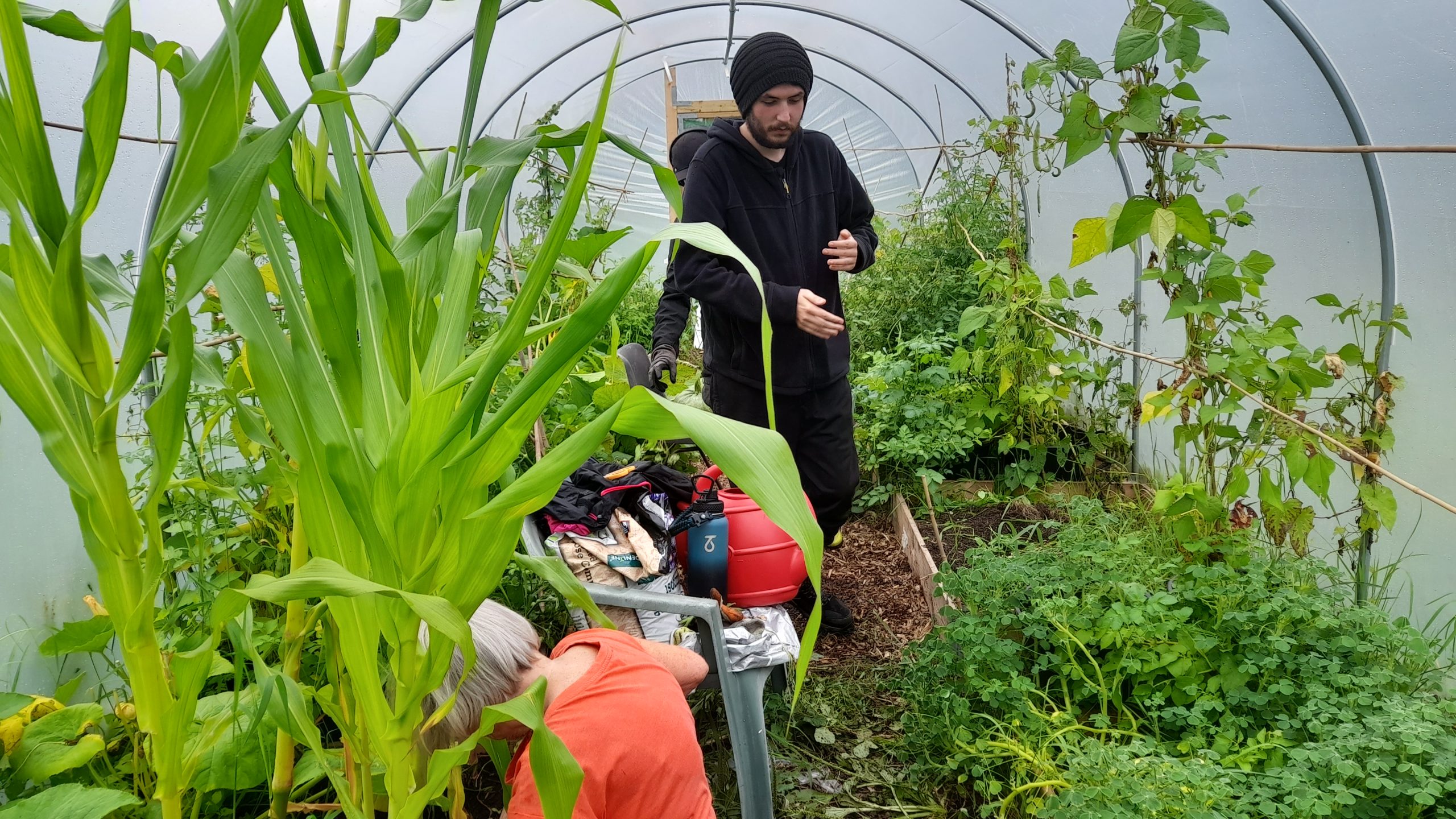
1 December 2023
9 minute read
This article was first published in Permaculture Magazine issue 118.
If a stranger knocked on your door, offering to plant a fruit tree in your garden, how would you respond? Earlier this year, Steve Jones and Ben Blackburn spent a day a week planting 85 apple, plum and pear trees on their estate in Bolton.
“People were a bit wary at first,” Steve said. “We had to say it really quick – so they couldn’t shut the door in our face. There was a bit of disbelief, ‘we’re getting it for nothing?’”
After the initial surprise, residents were really welcoming, joining in with digging a hole, planting the tree, asking when it would fruit and how to care for it, inviting Steve and Ben to stay for food and conversation.
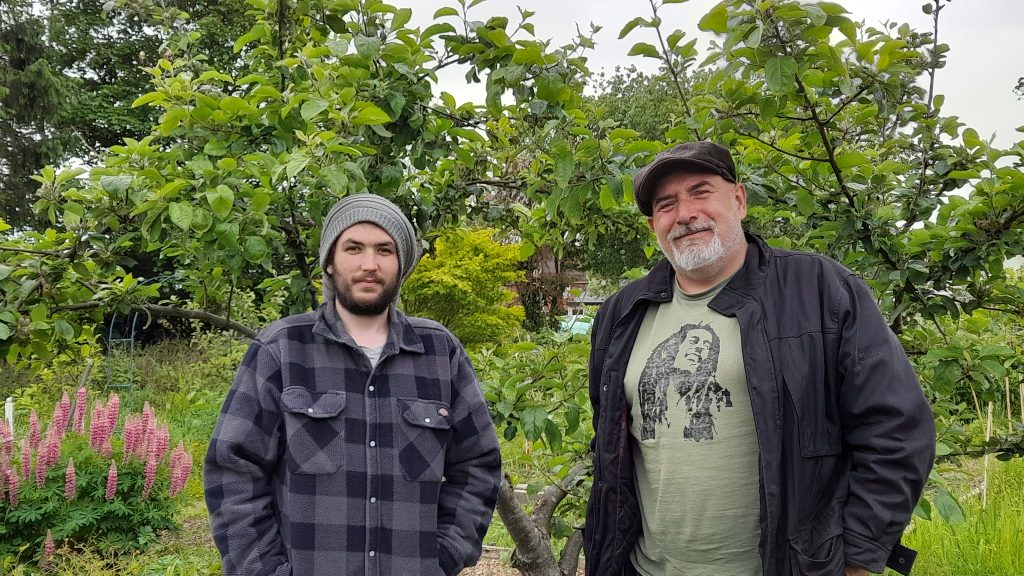
It’s the latest expression of Steve’s long-held passion to bring permaculture into working class communities. Steve says residents of the Great Lever Estate were economically deprived and already struggling to access good, healthy food before the cost of living crisis hit home.
At the start of 2023, under serious pressure as food prices spiralled, they hit on this simple way to give people the power to grow their own fresh, local food for years to come. As part of the Transition movement, their community organisation, Community Roots Permaculture Project, was able to access a small Transition Together seed funding grant to buy trees.
“In terms of the demographic, a lot of the gardens where we were planting trees, the families were Indian, Bangladeshi, a few Afghani, some refugee families and some white working class Boltonians,” said Steve.
“In Muslim culture, it’s a sign of good luck to have a fruit tree in your garden, it’s considered a great act of charity. It was quite emotional – we were doing it during Ramadan, we had people saying what a beautiful and selfless act you are both doing by providing and planting the trees.
“We sat in the garden of Pakistani people drinking orange juice and were offered food – that doesn’t happen around here,” he reflected. “Growing food is the best tool for community cohesion there is, simply because we all eat food.”
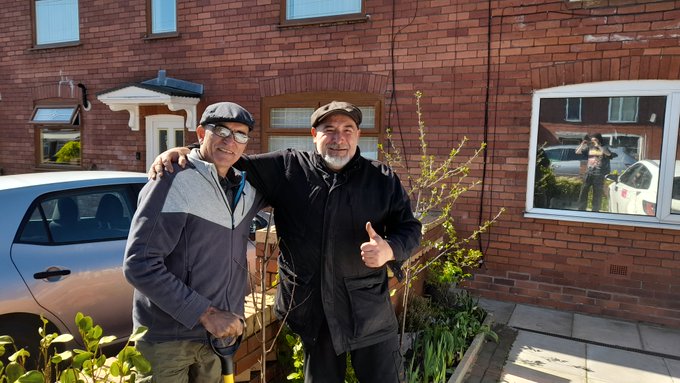
When I speak to Steve, he’s in the polytunnel on a growing site shared by his organisation, a mental health project run by a local housing group and the Bolton Diggers, south of Bolton town centre.
“We were invited to use the site by Alan Brown of Bolton Diggers two weeks before lockdown – it was an awkward time for us,” recalls Steve. He used his hour of permitted exercise to deliver tomato plants and other growing resources on the estate, and later the allotment became a place for wellbeing, being out of doors and they planted their first spuds.
Steve, who grew up in a similar community in Salford 15 miles away, first got into permaculture when he took an introductory course at Ruskin College in 1995 – his interest was sparked when it was mentioned by punk band Killing Joke that he followed. (Happy Mondays’ Bez is a fan of Steve’s work and has visited one of his community gardens).
Later, after settling in Bolton, he recalls sitting in his small back garden on a fine summer’s evening, feeling “incensed that only people on good salaries could afford organic food.” He initiated several growing projects, including a Men in Sheds project and a community food growing project in Farnworth, but it was about five years before Community Roots got their own piece of land.
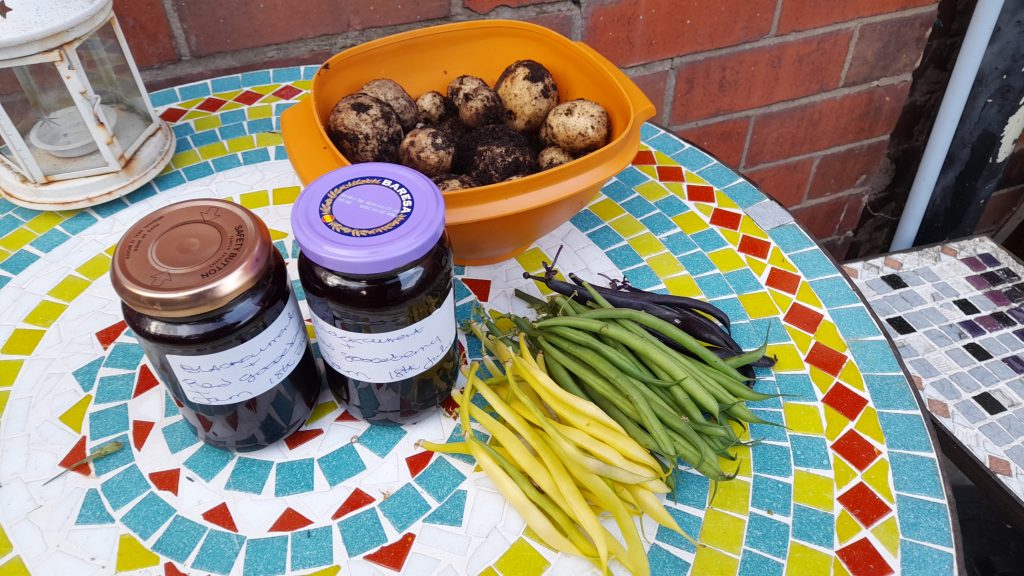
The ground is rough and weedy, but with hard work they’ve made it productive. Harvests are shared among volunteers and through local charities.
“We’re not a food bank, but with succession planting, we’re giving away kilos of food. We’re feeding ourselves and people who turn up to the project,” he said. “Most people who turn up haven’t got a pot to piss in. We’re in the same position as the other people – the only difference is we’ve got a bit more knowledge. It’s saving us as well as the desperate people who are coming.”
With the cost of living crisis, they are seeing more people wanting to get involved. Their workshops offer practical skills relevant to their community – from thrifty growing to preserving, making rocket stoves or seed bombs with kids, introduction to permaculture and home composting.
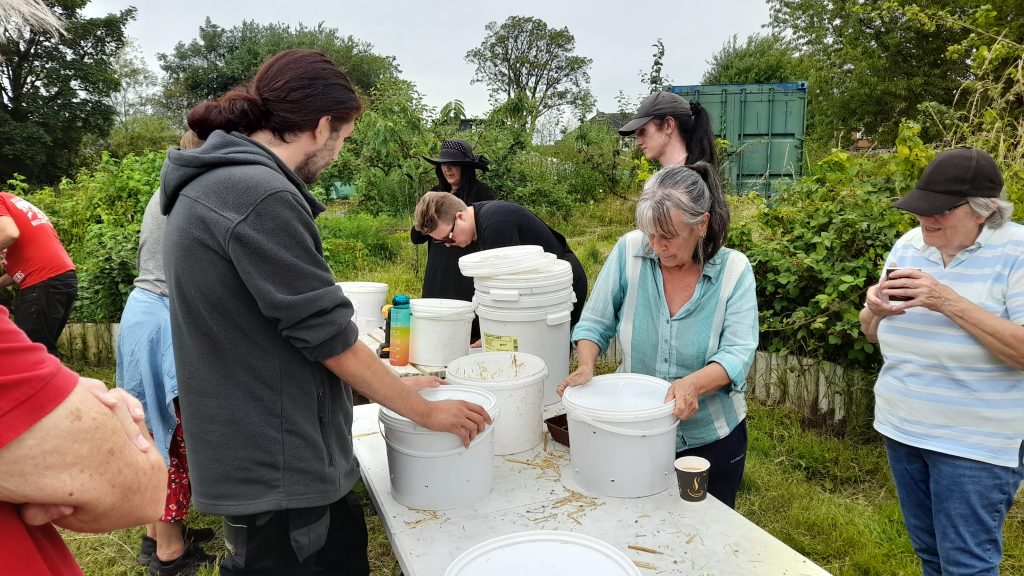
“Community groups like ours can help people to eat well. We’ll provide them with as many resources as we can,” said Steve. “If you’re using a food bank – like lots of people here who are really struggling – and you have a small garden, you aren’t going to be self-sufficient, but that food that you grow could be the most nutrient dense food that people get to eat.”
“Transition and permaculture have been saying it for years – the way food is produced is problematic, and that at some point there are going to be shortages. We should be supporting communities to feed themselves.”
Yet often this isn’t happening in those communities where opening up new supplies of local, fresh, low cost food would make most difference. Why is that?
The way permaculture is sometime described can be a barrier, Steve believes: “With permaculture, you can approach it as an academic subject, and have hardly anybody understand what you’re talking about on the estates where I work. Or you can strip away the scientific language and explain to people in a very down to earth way, that it’s about getting close to nature and having a different relationship with nature, that it’s an approach, a way of thinking and doing things. And get stuck in and do it in practice.
“Make it dangerously enticing and simple, so people think ‘we can do that’,” he advises. If you want to reach more people in working class communities, “reach out, knock on doors, leave a leaflet, as people have busy and pressured lives, put on activities which are free, open to all and include activities for children.”
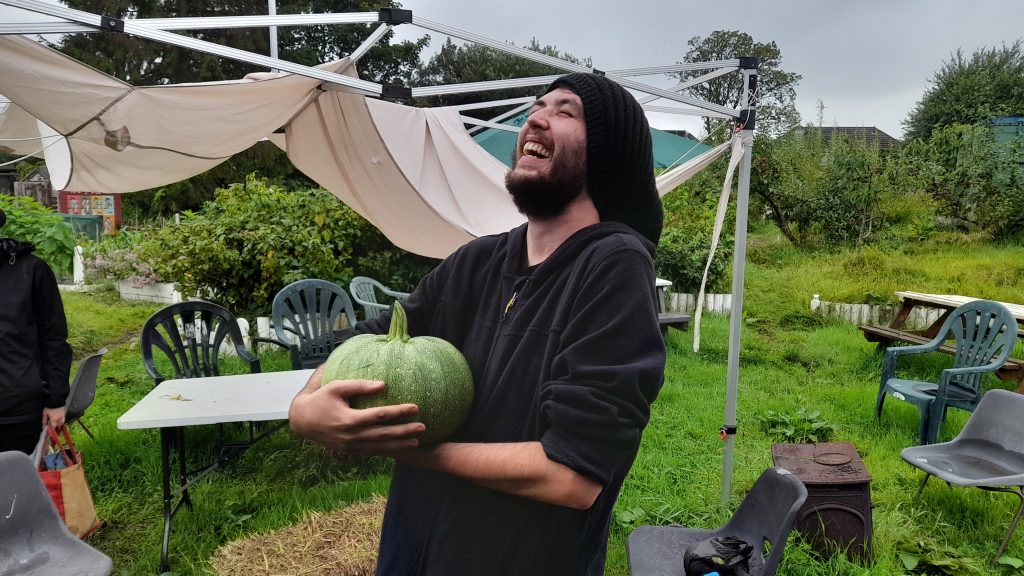
Permaculture has never been more relevant to working class and underserved communities – most likely to face pollution and environmental destruction; least likely be able to access nature, land and affordable, healthy food.
Steve adds: “I can’t think of many other projects where you are doing carbon sequestration, where your feeding people, getting to talk to people in your community and reintroducing pollinators into the area again. There’s a massive amount of stacking functions, when you look at it.”
Steve and Ben are in and of the community – still their growing work has opened many new connections and friendships: “I’ll be in Asda looking at reduced stuff, and someone says over my shoulder, ‘I wouldn’t chance that”, and it’s an Asian guy who we’ve planted a tree for.”
They are also witness to the incredible skills and energy from others within the community. Many immigrant families come from agrarian backgrounds and bring experience of growing and using a wide variety of crops. Steve shared how a growing project bringing together 30 local families with Congolese refugees became a real exchange: “We learnt loads off them, how they used different produce in ways we wouldn’t think of. They cooked salfish for us and we made them tatternash, a local Lancashire dish.”
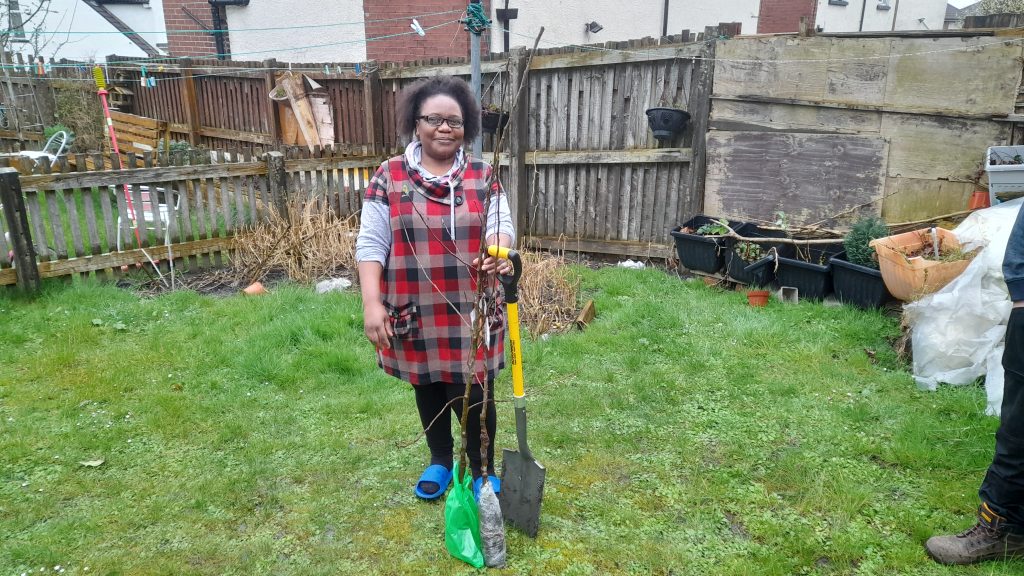
Through the cost of living crisis, Steve and his neighbours have drawn together, because everyone’s struggling: “We’ve shared seeds with our neighbours. We’ve helped each other out and shared food. It’s dead easy, like working class communities were in the 70s.”
Next year with sufficient funding, Steve wants to run three or four free introductions to permaculture courses in the town, and has already made links with community organisations to find participants. “It’s good value for money – we can make a real difference,” he said. The fruit tree project reached more than 80 households for just a few hundred pounds. Steve said: “Projects need to be simple so anyone could deliver it and understand and make sense of new and traditional skills. That fruit tree project – anyone can do it.”
Steve’s vision is the ‘re-greening of Bolton’: “If we got everyone growing food, guerilla gardening, got councils onboard, plant lots of trees and promote low impact initiatives that save people money, that’s us trying to redress the climate crisis.”
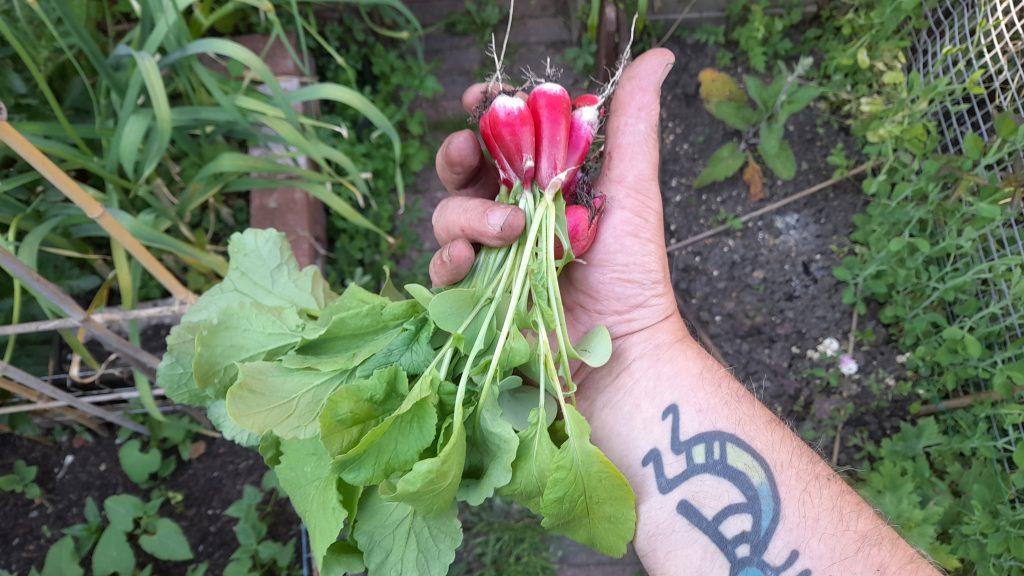
It’s not just about food and climate; it’s about people. “My long-term objective has always been to try and get permaculture into working class homes and gardens, because I’ve worked with people suffering with poverty, mental health, substance misuse, homelessness – and you’re seeing how permaculture can really help.”
“I want to see healthy Boltonians who actually get a buzz out of going out of the garden, being out with the kids, maybe cooking a meal outdoors. It’s about food, climate and people coming back down to earth and having a sense of gratitude.”
“Even now, I’m still absolutely humbled when I go around the garden and pick stuff to cook and eat. It’s all human stuff. It’s all about getting back to the human.”
For more information:
Transition Together seed funding: https://transitiontogether.org.uk/seed-funding/